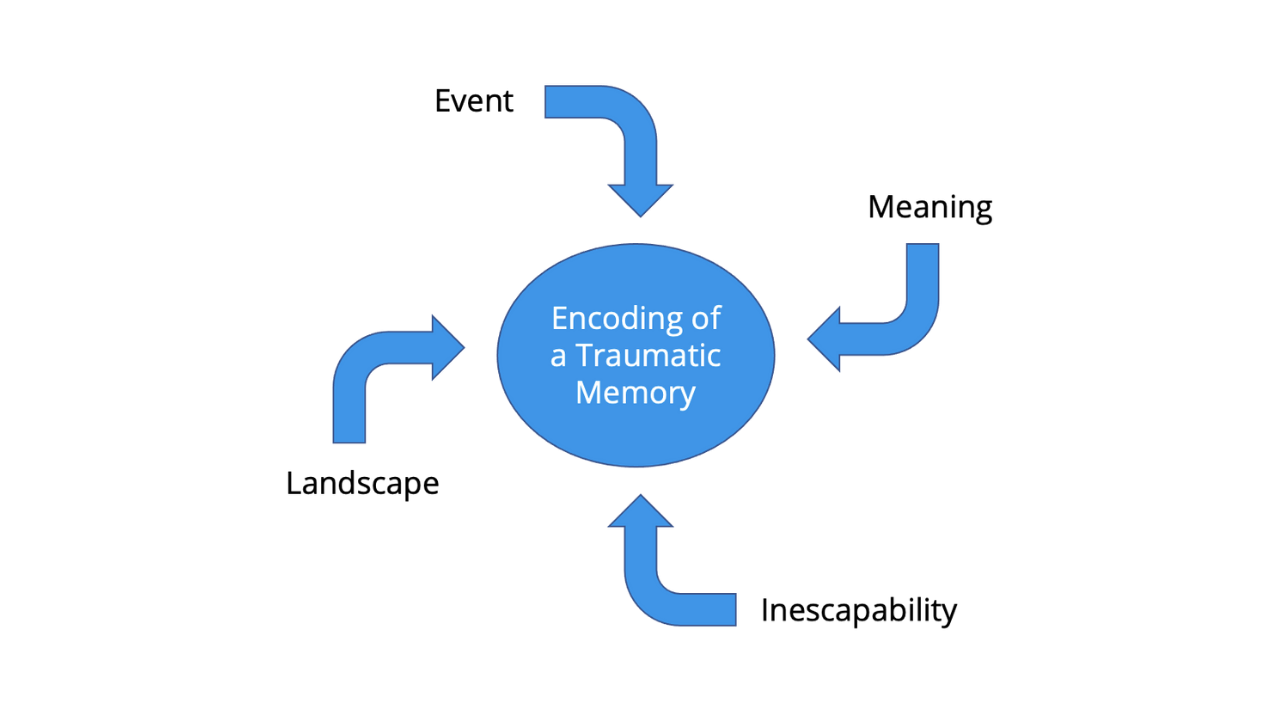The four basic elements for a trauma to be encoded in your mind
Aug 04, 2021
A lot of people talk about two types of trauma - big Trauma and little trauma. The truth is, size doesn't matter when it comes to trauma.
Trauma doesn't care about your age, colour, size, shape, gender bias, ethnicity. Trauma is trauma, irrespective of how long ago it happened.
If you have the four basic elements necessary for a trauma to be encoded in your mind, it doesn't matter how you or others perceive it's importance, the encoding will be there in your mind regardless. So what are the four elements for a trauma to be encoded?

Element 1 - Event
An event will have taken place, whether you remember it or not, that is significant for your mind. This can be a singular event or in the instance of layered trauma, multiple events, constituting an 'experience.'
Traumatic events can be encoded in your mind as soon as your brain comes 'online' in the womb. You don't have to 'be in' the event. You can be a witness to it - either physically or watching it on TV/social media. You can also be told about it, or sense it in the context of pre-birth trauma, when your senses come online or you experience a rush of cortisol and other chemicals through your biological mother as a result of her experiencing it.
Element 2 - Meaning
Your mind assigns a particular meaning to that even. In essence it sees the event as a threat, in whatever form your mind interprets that threat. This meaning generates an emotional response. Meaning can be learned - such as the fear of a gun, or innate, such as the fear of heights.
We have a sense of attachment to living, to our bodies, to our friends and also to who we are in the community. When our sense of attachment is threatened we fear loss and a powerful emotional response is produced.
There are several different types of threat - which can broadly be broken down into two categories - unconditional threat stimuli and culturally based threats.
Unconditional threat stimuli include:
- Abandonment
- Somatic pain
- Heights
- Suffocation
- Being trapped
- Open spaces
- Darkness and night
- Air based or ground based predators
- Being killed by a predator
- Smell, sight, sound, touch or taste of a predator, which includes food is perceived could do us harm for example
Culturally based threats include:
- Personal and public based threats
- Loss of reputation, status or culture
- Betrayal
- Excommunication
- Shame or guilt.
These two elements are not enough for a trauma to be encoded in our mind.
Element 3 - Landscape
The third element is having a vulnerable landscape of your brain at the time the event occurred.
The landscape in your brain is the electromagnetic chemical state at the time of the event. It is the sum of our inherent temperament, sensitivity to stressors, and experiences we have had.
For example, you may have experienced events that you had previously encoded as a trauma, or something else was happening in your life at the time that was stressful, which increased your vulnerability to having the trauma encoded in your mind.
Research has shown that children who witnessed the 9/11 attack and had a previous frightening experience were at high risk for developing emotional and behavioural problems. In fact 40% of those that had an earlier trauma suffered from depression, emotional outbursts or poor sleep three years after 9/11.
Element 4 - Inescapability
The fourth element is inescapability. You perceive the event as inescapable. It doesn't feel safe. You wanted to be able to 'escape' from it, but you couldn't for whatever reason.
It might be because you were unable to due to your age or mobility, you couldn't because of your cultural, societal or family circumstances. You could have been physically trapped due to the situation or the speed at which the event occurred, or your escape route was blocked.
Or perhaps it wasn't an event that you could escape from because of the circumstances and it was your duty to stay and offer support.
When it comes to trauma time doesn't heal, time steals your mind
Holding onto unresolved trauma is one of the worst things you can do. Like an ember, it burns inside your mind. Burying trauma doesn't put it out - it still burns. The longer you leave it the worse it gets.
The more traumatic experiences you have that are left unhealed, the more you add fuel to the fire inside your mind.
Unresolved trauma can wreak havoc on your mind and body due to increased levels of the stress hormone cortisol. This makes you more susceptible to future stressors and chronic illnesses.
Have you been involved in an experience that was significant for you? That felt like a threat? At the time you felt vulnerable? You couldn't escape from it?
The chances are you experienced trauma. The good news is you don't have to hold onto trauma. You have the power to let go of trauma and unchain your pain to finally start living again. FAST.
If you are ready quench the fire burning inside your mind, let go of unhelpful emotions and bodily responses so you can start living again, register for Trauma Recovery Coaching by visiting www.ruthmaryallan.com/traumarecovery
Or contact us to discuss how we can best support you in unchaining your pain and finally start living again.
This article is based on the research by Dr Ron Ruden, entitled Harnessing Electroceuticals to treat disorders arising from traumatic stress: theoretical considerations using a psychosensory model.


